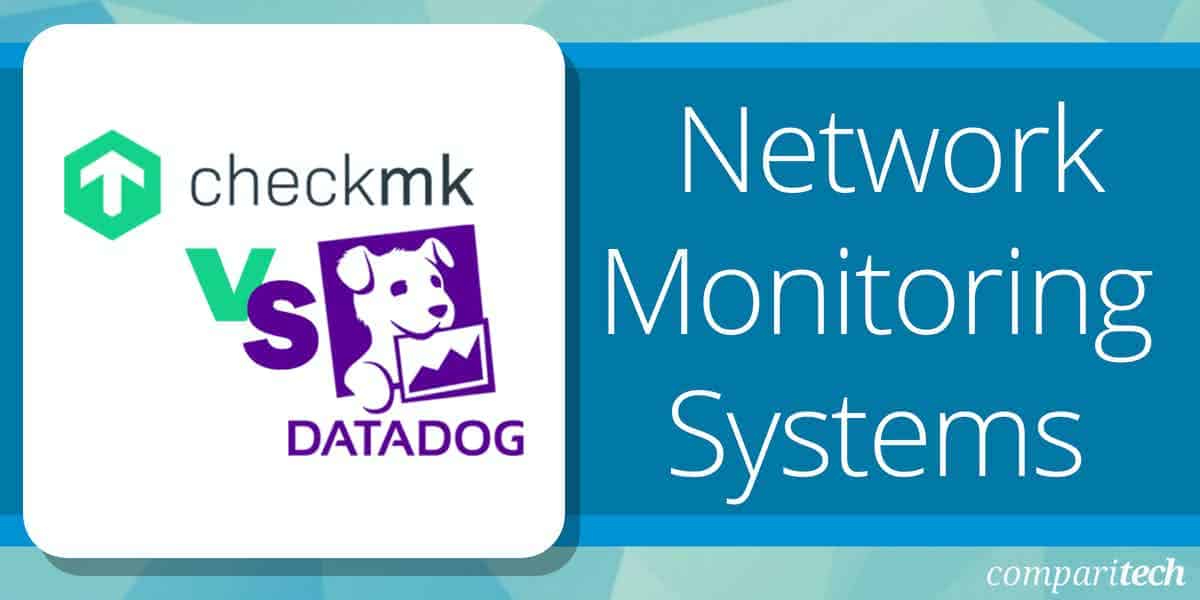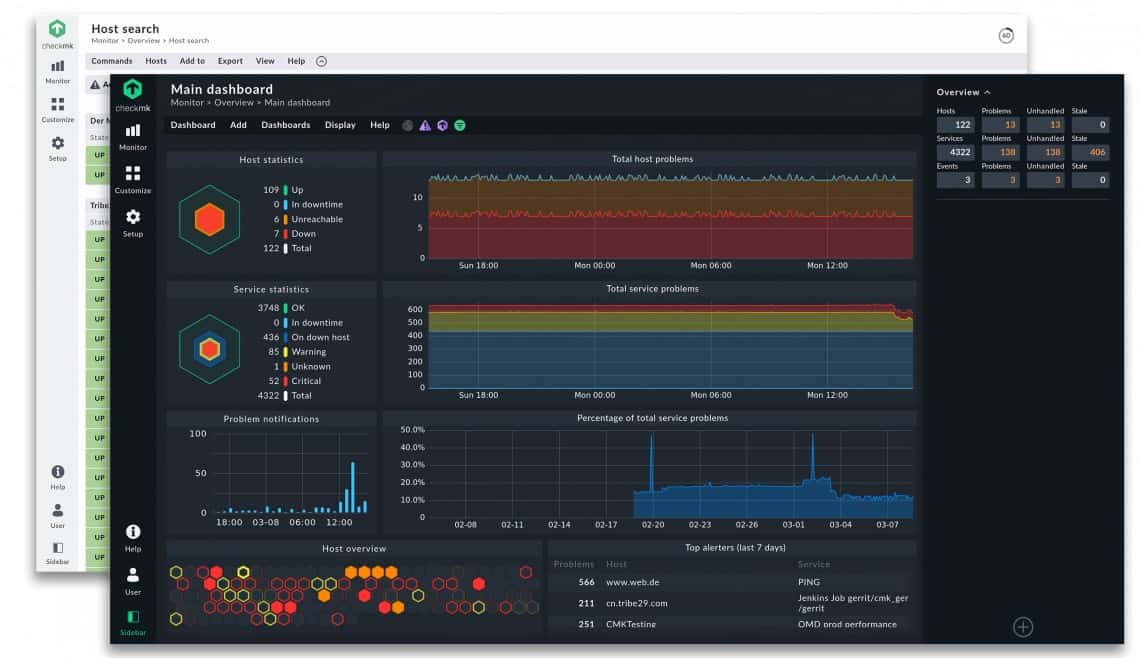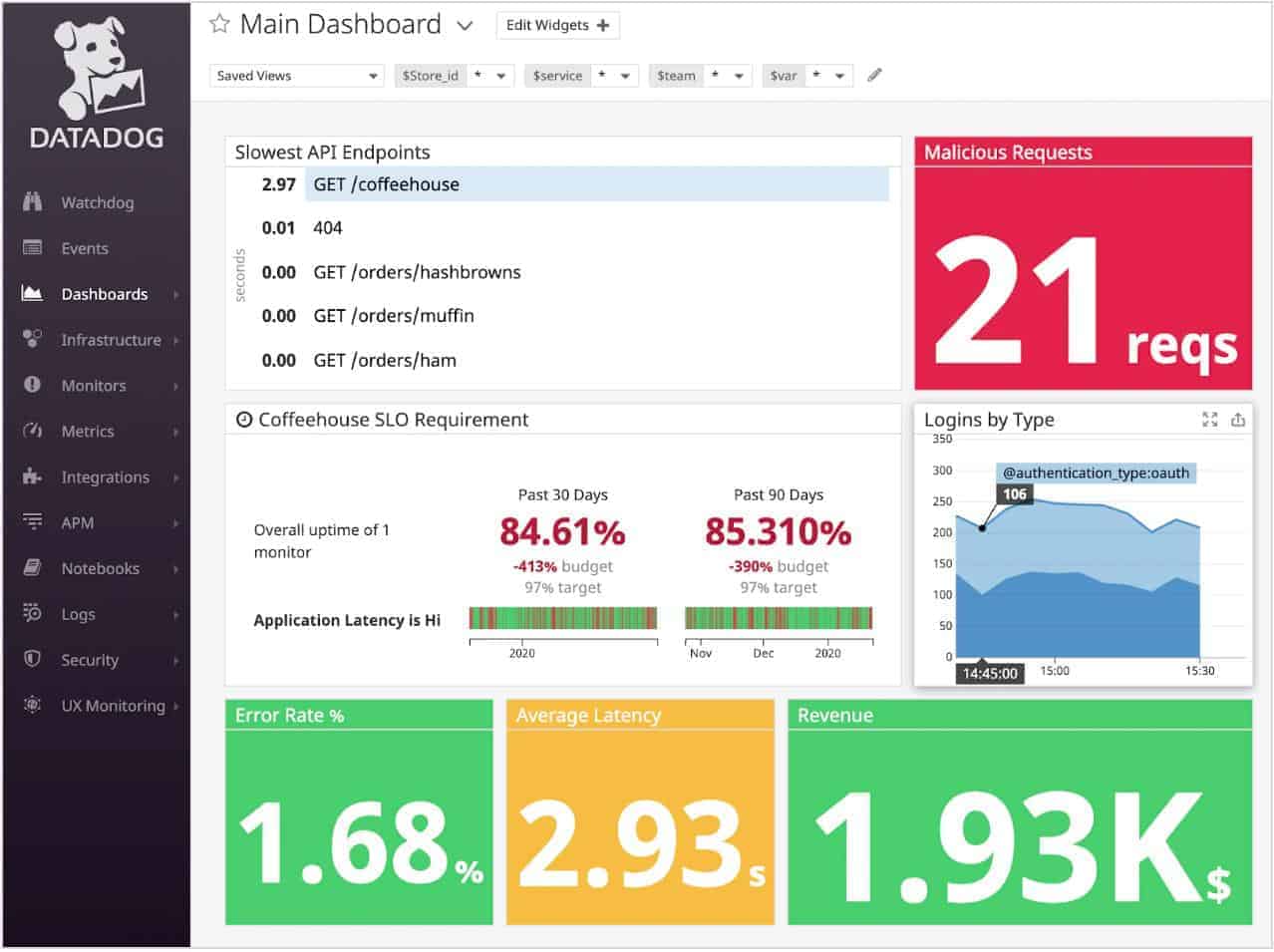Checkmk and Datadog offer system monitoring services. While Checkmk is a software package, Datadog is delivered as a hosted service. The difference between these two delivery models might be the deciding factor in your choice if you have narrowed down your search for a system monitor to these two candidates.
The packaging of these services is different as well. While both systems break up monitoring tasks into specialized modules, Checkmk offers all of its modules in one bundle but Datadog prices each module individually.
The development of Checkmk and Datadog has run in parallel as both of these services are roughly the same age. However, US-based Datadog has had much more funding and takes a corporate approach to its organization, while Checkmk has more community involvement in its development and support operations.
To fully understand the differences between these two monitoring systems, it is necessary to look into how each of these providers started and how they evolved their services.
Checkmk highlights
Checkmk, which was initially called Check_MK, was created by Matthias Kettner in 2008. Kettner made a company to manage his product based on Nagios Core, which is another free, open-source IT asset monitoring package. The company was called Matthias Kettner GmbH, but it has since changed its name to tribe29 GmbH. Kettner is still working at the company as its Chief Technology Officer.
The enterprise is based in Munich, Germany, and has offices in the UK, the USA, and Canada. The business is still a private company.
Kettner and his team developed an alternative architecture for Checkmk, which wasn’t based on Nagios Core. Both systems are now available, with the original, Nagios-based system offered for free as a community edition, called Checkmk Raw. A significant feature of Nagios is its extensibility. Its users and the producers of related IT systems have produced plug-ins that adapt and extend the system to give it interoperability with other tools and provide additional functions. Both Checkmk editions are compatible with this architecture and can accept Nagios plug-ins, which are free.
Key information:
- Checkmk is an on-premises monitoring solution
- Checkmk can monitor cloud resources, virtualizations, and containers as well as on-site assets
- Checkmk has a free edition, a free version of its paid edition, plus a free trial
- Checkmk Raw can be rewritten entirely, and Checkmk Enterprise allows for the creation of customized screens
- The users of Checkmk include Fitbit, Groupon, Adobe, and NASA
Datadog highlights
Datadog began operations in 2010 when Olivier Pomel and Alexis Lê-Quôc created it. The pair are still involved with the company – Pomel is its CEO, and Lê-Quôc is the Chief Technology Officer. The company was listed on NASDAQ in 2019.
The original Datadog code was written in Python for Server Density. After acquiring the system, Datadog’s founders eventually wholly rewrote it in Go and moved the software to a hosted system as a SaaS package. Datadog’s core functions are to monitor networks, servers, applications, and cloud resources. The company also offers a log manager, a SIEM system for security monitoring, a Web asset vulnerability scanner, and an Incident Management package.
Datadog will monitor on-site resources plus Docker AWS, Azure, and Google Cloud Platform. It can also perform Web asset testing and distributed tracing for microservices. Features in its application monitor use AI methods to predict evolving resource shortages, and the service also performs application dependency mapping. The network module has an automatic device discovery system, and it creates network topology maps. In addition, Datadog will automatically generate hardware and software inventories.
Key information:
- Datadog is a SaaS platform that uses local agents to gather data
- Datadog monitors on-site, cloud, and hybrid systems, consolidating the supervision of multiple locations
- Datadog offers security services, including a SIEM and a cloud a vulnerability manager
- Datadog automatically scans systems creating hardware and software asset inventories
- The customers of Datadog include Samsung, Whole Foods, Peloton, and 21st Century Fox
Checkmk vs Datadog head-to-head
Checkmk and Datadog perform many similar tasks. However, there are several differences in the methods they use for monitoring. The most significant difference between these two systems lies in their deployment strategies. Another difference between these systems is the way they are marketed to users. Checkmk offers one bundle of services, while Datadog markets each of its modules individually.
Checkmk
There are two versions of Checkmk:
- Raw Edition – a free open source version with community-based support
- Enterprise Edition – a proprietary version with professional support
The Enterprise Edition of Checkmk is offered in three plans:
- Free – The Standard Edition but limited to use with 25 hosts and limited to one site
- Standard – The main package with all of the modules and no host or location limits
- Managed Services – A multi-tenanted version of the Standard plan, designed for managed service providers.
The Raw Edition is based on Nagios Core, which is another free system monitoring package. The Enterprise Edition was developed entirely individually; for example, As the system is based on Nagios Core, it can take all of the free plug-ins written for Nagios. Despite being custom-written, the Enterprise Edition is also compatible with Nagios plug-ins. All versions provide both agentless and agent-based monitoring strategies.
The modules included in each edition are:
Raw
- Network monitoring — network device statuses
- Server monitoring
- Application monitoring
- Multi-cloud monitoring — AWS and Azure
- Database monitoring – Oracle, SQL Server, MySQL, MariaDB, SAP HANSA, PostgreSQL, MongoDB, IBM DB2, IBM Informix, Amazon RDS, and Azure SQL
- Storage monitoring
- SNMP monitoring
- Log & event monitoring
- Automatic network discovery
- Automatic service discovery
- Hardware and software inventories
- Distributed Monitoring
- Availability analysis reports
- Password locker
- Community support
Enterprise Edition
- Agent-based monitoring
- Agentless monitoring
- Server monitoring
- Network monitoring — network device statuses
- Network flow monitoring – not included in the Free plan
- Application monitoring
- Multi-cloud monitoring — AWS and Azure
- Dynamic container monitoring – Kubernetes, Docker, Openshift, and LXC
- Database monitoring – Oracle, SQL Server, MySQL, MariaDB, SAP HANSA, PostgreSQL, MongoDB, IBM DB2, IBM Informix, Amazon RDS, and Azure SQL
- Storage monitoring
- SNMP monitoring
- Log & event monitoring
- General functionality
- Smart and granular alerting
- Business process health monitoring
- Hardware and software inventories
- Distributed monitoring
- Trend prediction
- Advanced forecasting
- Availability analysis
- SLA reporting
- Automatic network discovery
- Automatic service discovery
- REST API
- Automated monitoring for dynamic, ephemeral infrastructures
- Agent mgmt. & automated agent updates
- Automatic remediation handler
- Recurring maintenance downtimes
- Extension packages management
- Password store
- Community support
Professional support is available to users of the Enterprise Edition but for an extra fee. Some functions require the ntop or i-doit systems to be added on.
Datadog
Datadog has 12 modules, but some are offered in different versions containing additional services, so effectively, there are more than 12 modules. These are:
- Infrastructure – Monitors network, servers, and services, including virtualizations, containers, and cloud platforms. Add-ons for this module are the monitoring of AWS Fargate data and IoT device monitoring.
- Application Performance Monitoring – This service includes application dependency mapping and uses AI methods to work out when commonly used resources are overloaded.
- Continuous Profiler – Offered in a combined service with the Application Performance Monitoring service as a higher APM plan, this module displays code as it runs and analyzes performance. It is for use by application developers.
- Database Monitoring – Monitors PostgreSQL, MySQL, Amazon RDS, Amazon Aurora, and Google Cloud SQL.
- Accurate User Monitoring – Live website performance monitoring feeding through to an Error Tracker module.
- Synthetic Monitoring –API tests for automated system checks and Browser-based tests to exercise interactive elements in Web pages.
- Serverless Monitoring – Distributed tracing for microservices with AI-based resource requirement predictions.
- Network Performance Monitoring – Network traffic analysis for physical networks.
- Network Device Monitoring – SNMP-based network device status checks.
- Log Management Ingest – Collects, consolidates, displays, files, and searches through log messages.
- Retain or Rehydrate – A log archive management system.
- Security Monitoring – A breach detection system that operates as a SIEM, mining log files.
- Cloud Security Posture Management – A continuously operating vulnerability scanner for cloud services.
- Cloud Workload Security – Real-time protection for Internet-based assets, including file integrity monitoring and hacker activity detection.
- Incident Management – An issue tracker and team management package for use as a Help Desk platform or a collaboration and task management tool for development teams.
Deployment options
Datadog is offered as a SaaS package and installs agents on monitored services. These agents are available for
- Windows
- CentOS Linux
- Ubuntu Linux
- Amazon Linux
- Fedora Linux
- Debian Linux
- SUSE Linux
- RHEL
- AIX
- macOS
- Kubernetes
- Docker
The package interfaces with native platform statistic collectors in AWS, Azure, and Google Cloud Platform.
Checkmk is an on-premises package, and all versions install on:
- Ubuntu Linux
- Debian Linux
- SLES Linux
- CentOS
- RHEL
- Docker
The software is also available as a virtual appliance, a solution to run the system in a Windows environment.
Checkmk also offers a monitoring system pre-installed on a range of physical network appliances.
Prices
Checkmk prices
Checkmk Raw is free forever. The base price for each of Checkmk Enterprise Edition’s three plans are:
- Free: $0
- Standard: $760 per year ($63 per month)
- Managed Services: $1,490 per year ($124 per month)
The Virtual Appliance installation has an extra cost based on $379 per year ($31 per month).
The charges increase by capacity with higher rates for an allowance to monitor more services. The base price gives an allowance of 3,000 services, which would probably cover about 100 hosts.
The following price point is for 7,000 services, which costs $1,490 for the Standard plan and $2,950 for the Managed Services plan, and the Virtual Appliance fee increases to $599.
The maximum capacity offered on the price list is 200,000 services, which would cover about 6,600 hosts. That costs $17,500 per year for the Standard plan, $31,500 per year for the Managed Services plan, and $2,290 per year for the Virtual Appliance supplement.
Checkmk offers three physical appliance models. These are only available in Europe. They are manufactured by Dell and are differentiated by the number of services they will monitor and, therefore, the number of hosts they will cover. They are:
- Checkmk Rack1 model 2021: 2,500 hosts, 50,000 services
- Checkmk Rack4 model 2021: 10,000 hosts, 400,000 services
- Checkmk Rack4+ model 2021: 12,500 hosts, 500,000 services
Maintenance and support are charged separately for all Checkmk products. A Community Forum is available for free advice.
Datadog prices
The prices for Datadog modules are:
- Infrastructure: Free – $0, Pro – $15, Enterprise – $23 per host per month
- Infrastructure add-ons: AWS Fargate data monitoring – $1 per task, IoT device monitoring – $5 per device
- Application Performance Monitoring: $31 per host per month
- Application Performance Monitoring + Continuous Profiler: $40 per month
- Database Monitoring: $70 per database per month
- Real User Monitoring: $15 per 10,000 sessions per month
- Synthetic Monitoring: API Tests – $5, Browser Tests – $12 for every 1,000 test runs per month
- Serverless Monitoring: $5 per million invocations per month
- Network Performance Monitoring: Network Performance Monitoring $5 per device per month
- Network Device Monitoring: $7 per device per month
- Security Monitoring: $0.20 per GB of throughput per month
- Cloud Security Posture Management: $7.50 per host per month
- Cloud Workload Security: $15 per host per month
- Log Management Ingest: $0.10 per GB of throughput
- Log Management Retain or Rehydrate: $1.70 per million log events per month
- Incident Management: $20 per user per month
Free trial
Checkmk offers a 30-day free trial of its Standard Enterprise edition. If you choose not to buy, this will switch to the Free Enterprise edition at the end of the 30 days.
Datadog offers a 14-day free trial on all of its modules.
The verdict
Comparing two systems is a difficult task, and working out price comparisons is complicated by the different pricing structures of Checkmk and Datadog.
Suppose you have already decided whether your preference is for a hosted system or a software package that you can run yourself. In that case, your choice should be easy because Checkmk is only for on-premises use, and Datadog is only available as a SaaS platform.
Take advantage of the free trials that both of these systems offer to run them through their paces and decide which you prefer.
L’article Checkmk Vs. Datadog est apparu en premier sur Comparitech.



0 Commentaires